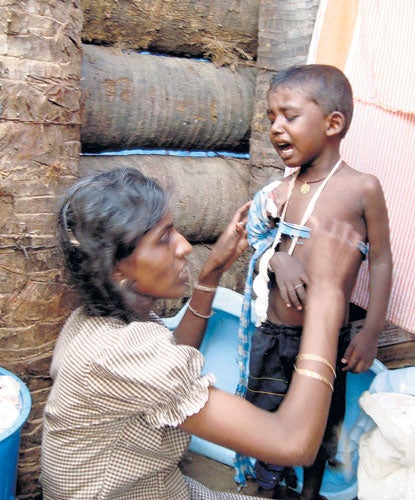Families trapped in Sri Lanka camps fear for missing children
Up to a fifth of refugee Tamil children have been lost or abducted, reports Andrew Buncombe from Colombo

Your support helps us to tell the story
From reproductive rights to climate change to Big Tech, The Independent is on the ground when the story is developing. Whether it's investigating the financials of Elon Musk's pro-Trump PAC or producing our latest documentary, 'The A Word', which shines a light on the American women fighting for reproductive rights, we know how important it is to parse out the facts from the messaging.
At such a critical moment in US history, we need reporters on the ground. Your donation allows us to keep sending journalists to speak to both sides of the story.
The Independent is trusted by Americans across the entire political spectrum. And unlike many other quality news outlets, we choose not to lock Americans out of our reporting and analysis with paywalls. We believe quality journalism should be available to everyone, paid for by those who can afford it.
Your support makes all the difference.In a world where people had lost everything, she held up the photograph as if it were the most precious thing imaginable.
It showed a young boy, no more than three years old, dressed in a blue and white outfit. It was Shanmugam Saraswathi's grandson Manimaran, and she had no idea where he was. "Please help me find him," she said, as she held up the picture.
Ms Saraswathi – a Tamil civilian who fled the war zone in Sri Lanka's north and is now being held at a refugee camp near the city of Vavuniya – is not alone. Aid agencies fear that hundreds of children have become separated from their parents in the chaos that followed the escape of up to 300,000 people from the last land controlled by the LTTE rebels. There are even allegations – denied by the government – that a number of children have been abducted from the camps by paramilitaries who enjoy tacit support from the authorities.
Ms Saraswathi, who had been in the camp for three weeks, said that Manimaran's mother, father and elder sister had been killed in the fighting and that the last she had heard of her grandson was that he was being cared for by a neighbour. Now she was losing hope of ever seeing him again.
With journalists prevented by the authorities from reaching the camps except on occasional, escorted visits, Ms Saraswathi's story was passed to The Independent by a trusted intermediary. "I don't know where he is," she added, standing in the playground of the school. As she spoke another half-dozen women gathered nearby, each with their own photograph, each with their own, similar story. It is impossible to estimate how many families have become dislocated as they wait in the refugee camps, surrounded by razor wire and from which they are unable to leave. A report by Save the Children suggested a fifth of all children were either missing or separated from one or both of their parents.
The charity said that while the Sri Lankan government had taken some measures to reunite such families, the situation remained dire. "The influx of people into the government camps was so large and so fast that I've come across hundreds of children who have lost their parents along the way," Stein Lied, a protection officer, said recently. "The running was so panicked that I've even met a lactating mother who lost her newborn as she was escaping."
Concern about such children mounted yesterday as another NGO alleged there was persuasive evidence that teenagers were being abducted from the camps by paramilitary groups. The Coalition to Stop the Use of Child Soldiers said it had received verified reports of abductions from camps in Vavuniya. It said several paramilitary groups, including the Eelam People's Democratic Party and People's Liberation Organisation of Tamil Eelam, apparently had unhindered access to the camps. It claimed that humanitarian workers said that most of the abductions have happened at night when there is less security.
The government staunchly denied the accusations yesterday. Mahinda Samarasinghe, the Minister for Disaster Management and Human Rights, said: "That is not correct. We have the responsibility for the protection [of people] in the camps."
Mr Samarasinghe said while there had been an initial problem of children being separated from their families, the issue was now being addressed and that around 3,000 families had now been reunited. He said telephones and databases had been set up at the camps to help families. He also said attention had been addressed to the problem of the flood of refugees overwhelming emergency medical facilities. "I'm not too proud to say that we can improve, but we are working on things together with our international partners," he added.
Meanwhile, the government said it planned to return most of the nearly 300,000 civilians to their homes by the end of the year. After visiting Indian ministers met President Mahinda Rajapaksa to express their concerns about the humanitarian situation, a joint statement was released saying the government had a 180-day plan to resettle the majority. Earlier in the week a government spokesman conceded that some of the refugees could be held for up to two years.
Join our commenting forum
Join thought-provoking conversations, follow other Independent readers and see their replies
Comments